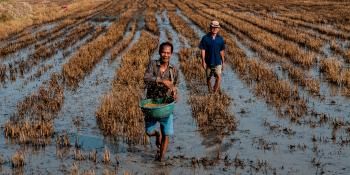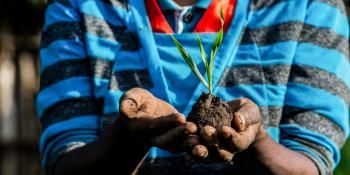Guided tours to Cinzana Climate-Smart Villages prepare farmers for a better agricultural future
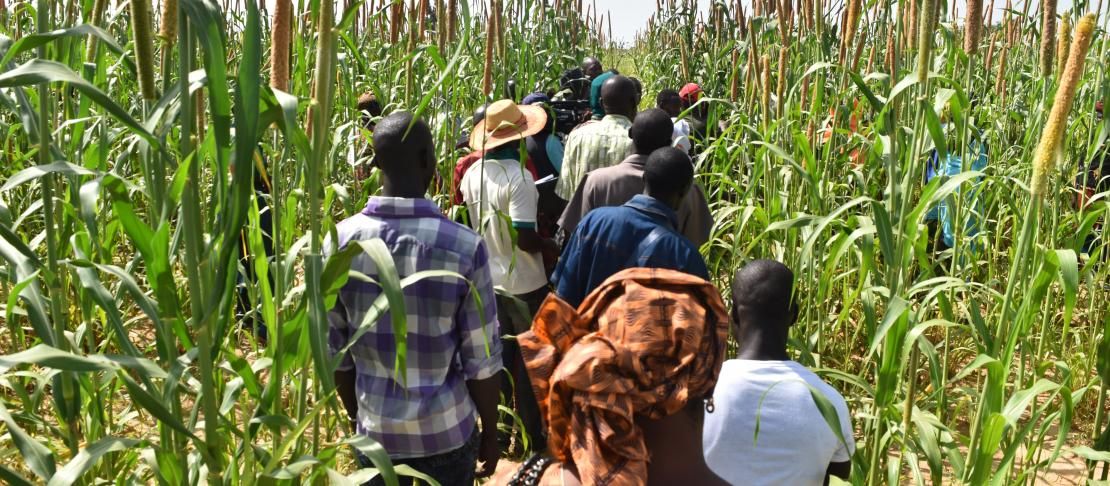
Guided tours to demonstration sites in Climate-Smart Villages (CSVs) help improve the knowledge of small farmers and enable them to understand climate-smart practices appropriate for their situations.
To ensure a better future for agriculture and food security, the CGIAR Research Program on Climate Change, Agriculture and Food Security (CCAFS) seeks to build the capacity of individuals, especially farmers, in order to enable them to cope with the threats of food insecurity due to climate change.
Farmers can take practical measures to adapt their farming practices so as to ensure reliable food supply and livelihood. They can do this by reducing greenhouse gas emissions or increasing carbon sequestration, thereby reducing climate pressure. CCAFS pursues these objectives mainly by implementing Climate-Smart Villages (CSVs).
In Cinzana, in the Ségou region of Mali, the rainy season is drawing to a close. Farms with millet, sorghum, cowpeas, fonio, and sesame, etc. are very extensive Ngakoro and Tongo CSVs. The farms include one for the demonstration of improved practices and climate-smart agricultural technologies.
At the end of this rainy season, the Institute for Rural Economy (IER), a strategic partner of CCAFS on the Climate-Smart Village approach, organized guided tours of the demonstration farms.
During the tours, farmers from surrounding villages within a radius of 0-10 km of each CSV joined those of Ngakoro and Tongo villages to see how effectively climate-smart technologies are used on the demonstration farms.
The tour was devoted to discussions and learning, as well as capacity building for stakeholders. Guided tours are not only good opportunities for the farming community in these areas to learn, understand and analyze their practices so as to see how effective they are but also to learn new practices that are effective for the local climatic situation.
A series of tested options
For two days, in Ngakoro and Tongo, a group of 105 farmers, including 46 women, observed and compared several climate-smart agriculture (CSA) options and technologies for rain-fed and market-garden crops through the introduction of new rainy season market-gardening varieties, pepper, onion, tomato, amaranth, eggplant, and okra. These experimental tests enabled the farmers to assimilate climate-smart agriculture techniques, some of which were unknown, or known but poorly practiced. Microdose technology, contouring followed by ridging with bunds, and market-garden crops on raised planks were unknown to many participants of the guided tour of the demonstration farms.
The tour provided an opportunity to assess the development of crops. At the end of the tour, the IER researcher in charge of the demonstration farms and his research colleagues invited the participants to individual interviews and focus groups to evaluate the visited tests and plan future activities.
Sitafa Coulibaly, a local farmer, was satisfied with the shared experience. During the individual interviews, he said: "The efficient and rational use of fertilizers, early seeds and contour plowing for better water retention are climate-smart practices that we will adopt in the coming crop seasons".
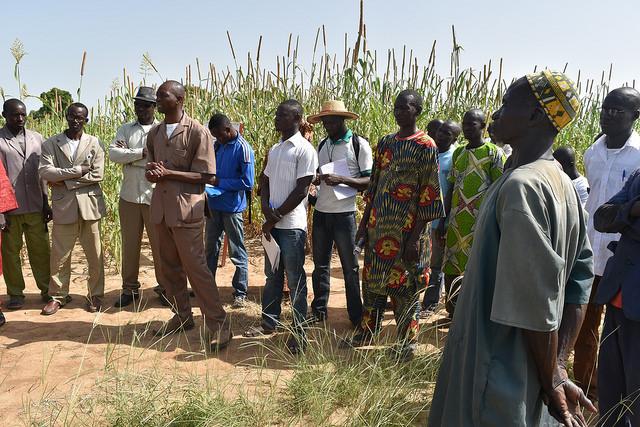
Session of explanations given by the researcher of the IER to the agricultural producers who came to attend the commented visit. Photo: D. Dembélé (CCAFS)
An excellent framework for discussion and exchange of experiences
This tour was an appropriate framework for placing local and climate-smart practices side by side. It offered farmers, most of whom have suffered from the adverse effects of climate change, the opportunity to see and adopt techniques that were often new to them. It was also an opportunity for them to understand how best to use the techniques already known. Hence the utility of contouring, microdose, improved varieties of millet, cowpea sorghum, pepper, onion, tomato, amaranth, eggplant, and okra were discussed. A useful partnership was established with the World Vegetable Center (AVRDC).
Mayama Yatoura, a vegetable producer, said: "This experience was very beneficial for me. Before the tour, I didn’t know anything about the existence of amaranth, which is a vegetable that is very useful for its nutritional and market value. In addition, I was impressed with the tomato variety grown there.”
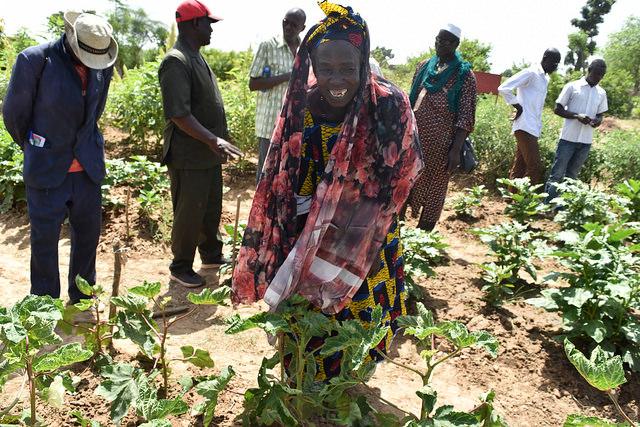
Mayama Yatoura, a vegetable producer. Photo: D. Dembélé (CCAFS)
Guided tours of this kind provide an ideal setting for farmers to discuss soil fertility management, water conservation, seed quality issues, and crop protection.
In this regard, the guided tours encouraged farmers to experiment with the techniques presented, thereby increasing the likelihood of farmers eventually adopting such climate-smart practices. In addition to building the capacity of local farmers, their livelihoods will also be improved.
Dansira Dembélé is communications officer at CCAFS in West Africa based at ICRISAT, Bamako, Mali
Siaka Dembélé is a scientist at the Institute of Rural Economy of Mali

